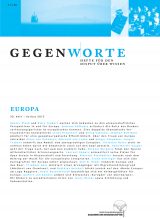
Gegenworte (PAST JOURNAL)
Gegenworte was a member of the Eurozine network until February 2017.
We live in a science-based society, but it is very difficult to find common ground for discussing this “base”. Knowledge of physics, mechanics, biology, etc., is highly specialised, and generally only experts can understand experts, and then only within their own narrow fields. There are efforts underway to make science comprehensible, but we believe that it is not enough simply to popularise the findings of researchers.
We need to find new ways of communication in order to eliminate the reasons for both the blind faith in, and hatred of science. Observing and reflecting the relationships between science and other arenas of society are among the prerequisites for a discussion that seeks to be more than merely a high-handed lecture. We also need a critique that takes a closer look at the scientific enterprise itself.
Gegenworte was launched by the Berlin-Brandenburg Academy of Science in 1997. The biannual journal aims to function as a platform for virtual dialogues and meetings, as well as a research project that debates problems on the margins of scientific fields. The journal endeavours to develop new forms of communication suitable to current conditions. Gegenworte constitutes an experimental space for a language that neither simplifies unnecessarily nor excludes the lay-reader. In Gegenworte, scientists from various disciplines debate with journalists, practitioners, authors, politicians and artists.
We publish articles about the conditions under which scientists work or fail, about the craft and implications of research. Additionally, we try to persuade our authors to explain not just what they are doing, but also their doubts and misgivings.Each edition features a theme of concern both to the scientific community and the general public. Ideas that cut across disciplines and genres are expressed openly in comprehensible language.
Topics to have featured so far include freedom of research, fraud in science, the public understanding of science, research about and animals used for science, interdisciplinary cooperation, the language of science, digitalisation, science and art, utopia and dystopia, the question of a new social contract with science, the relationship between myths and science, and reduction as a method of scientific research.
